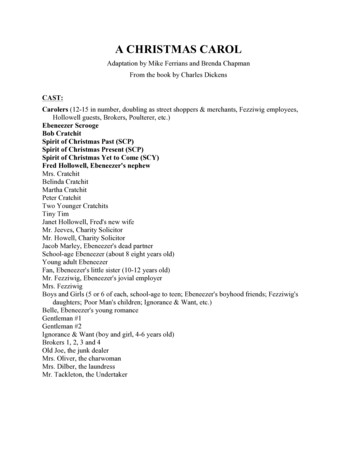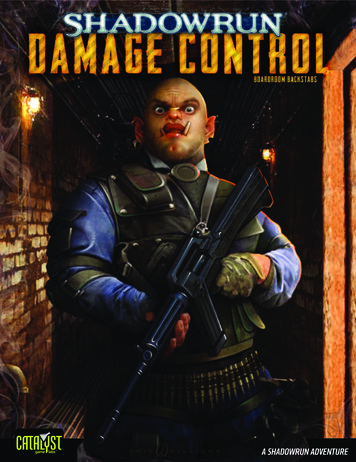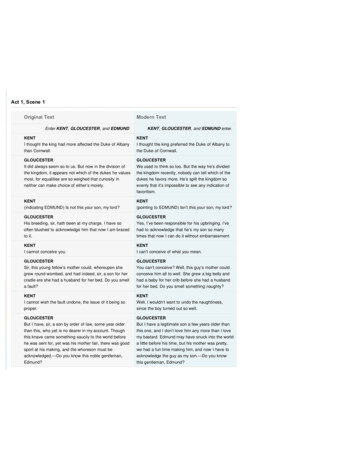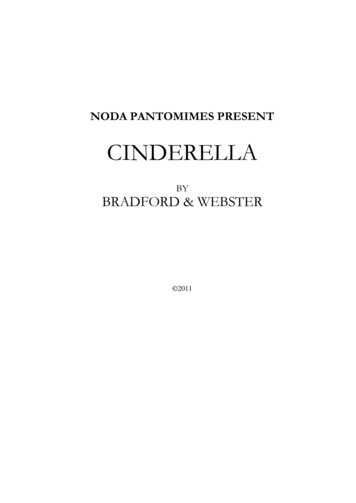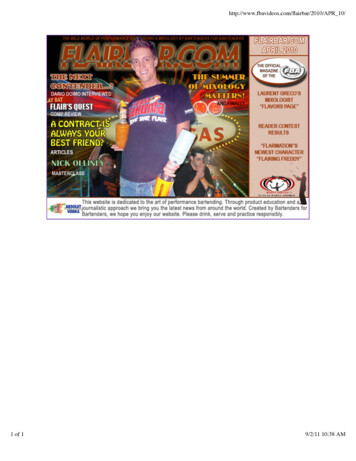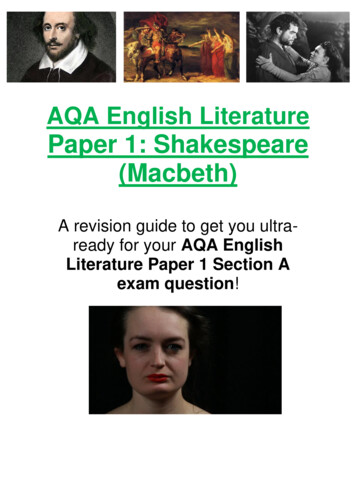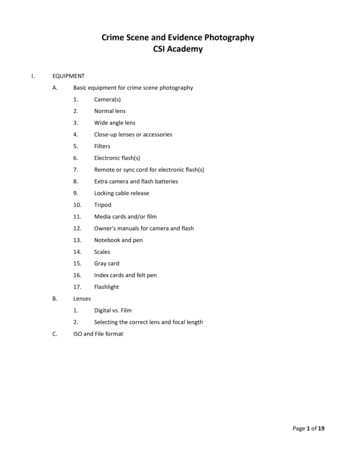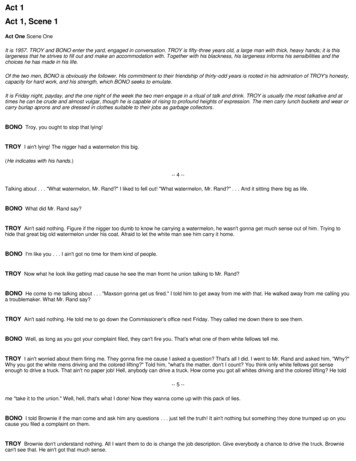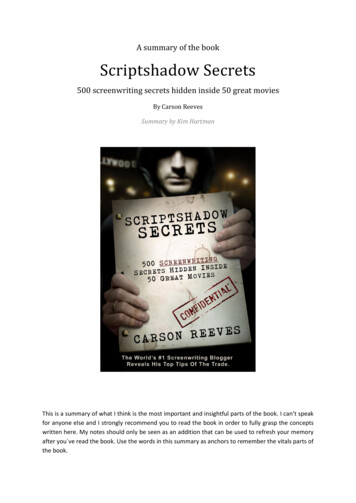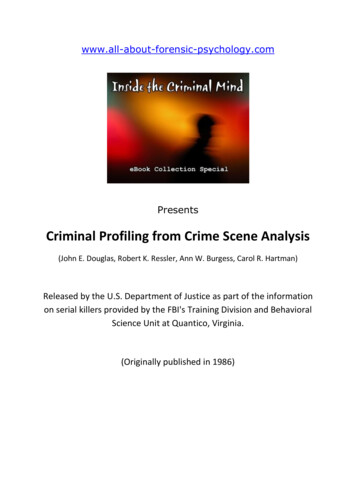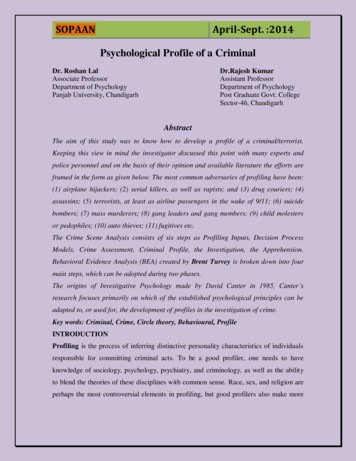
Transcription
Cambridge University Press978-1-108-45606-7 — King Richard III King Richard IIIWilliam Shakespeare , Rex Gibson , Edited by Linzy Brady , Jane Coles , General editor Vicki Wienand , Richard Andrews ,Edited by Pat Baldwin , Tom BaldwinExcerptMore InformationKing Richard IIIAct 1 Scene 1Outside the Tower of LondonEnter RICHARD DUKE OF GLOUCESTERRICHARDNow is the winter of our discontentMade glorious summer by this son of York,And all the clouds that loured upon our houseIn the deep bosom of the ocean buried.Now are our brows bound with victorious wreaths,Our bruisèd arms hung up for monuments,Our stern alarums changed to merry meetings,Our dreadful marches to delightful measures.Grim-visaged war hath smoothed his wrinkled front,And now, instead of mounting barbèd steedsTo fright the souls of fearful adversaries,He capers nimbly in a lady’s chamberTo the lascivious pleasing of a lute.But I that am not shaped for sportive tricksNor made to court an amorous looking-glass,I that am rudely stamped and want love’s majestyTo strut before a wanton ambling nymph,I that am curtailed of this fair proportion,Cheated of feature by dissembling nature,Deformed, unfinished, sent before my timeInto this breathing world scarce half made up,And that so lamely and unfashionablehat dogs bark at me as I halt by them,Why, I, in this weak piping time of peace,Have no delight to pass away the time,Unless to see my shadow in the sunAnd descant on mine own deformity.5101520257 in this web service Cambridge University Presswww.cambridge.org
Cambridge University Press978-1-108-45606-7 — King Richard III King Richard IIIWilliam Shakespeare , Rex Gibson , Edited by Linzy Brady , Jane Coles , General editor Vicki Wienand , Richard Andrews ,Edited by Pat Baldwin , Tom BaldwinExcerptRichard resolves to be evil. He tells the audience that he has arranged for King Edward to see his brother ClarenceMore Informationas a threat and imprison him in the Tower. He jokes about Clarence’s plight.StagecraftRichard’s soliloquy (in fours)entertain spend, enjoydeterminèd decided, resolvedRichard’s opening soliloquy falls into three main parts: Lines 1–13 His comments about the change from war topeace and the character of the new monarch, Edward (‘thisson of York’). Lines 14–27 How Richard feels about the way he looks. Lines 28–41 How he plans to gain power.A major decision for any director of the play is how to stage thisimportant speech. The conventional way of playing a soliloquy isfor the actor to speak directly to the audience, as if inviting themto share his innermost thoughts. In the 1996 movie version starringIan McKellen, however, Richard speaks the irst ten lines as if makinga public speech at a state banquet. The rest of the soliloquy isdelivered in private in the men’s toilet. What ideas do you havefor staging this speech?a One member of your group takes the role of director; the othermembers each choose one of the three sections listed aboveand read the lines aloud one after the other. Think about howyou might create contrasts between voice, gesture and bodylanguage as you swap over from section to section.b What particular words or images give you clues about how youmight play the part? Compile a list in your groups.inductions preparationslibels lies about peoplesubtle craftymewed up imprisoned, caged likea hawkAbout a prophecy by meansof a prophecyDive descendguarded surrounded by guardsTend’ring caring forconduct guardthe Tower the Tower of London(both a royal residence and astate prison)belike maybe1 Dramatic irony (in threes)Richard has just told the audience how he is plotting to destroy hisbrother George, the Duke of Clarence, so almost all of what Richardsays to Clarence’s face is illed with dramatic irony (when the audienceknows more than a character on stage, see p. 251). Richard pretends tobe innocent, but he already knows the answers to the questions he asks.cross-row alphabet Two members of the group take the parts of Richard and Clarence andread through the script opposite from line 43. The third person voicesRichard’s hidden thoughts at appropriate points. For example, whenRichard says, ‘Brother, good day’, does he mean this? What is he reallythinking? Practise reading the script in this way up to line 61, then shareyour presentation with the rest of the class.toys fanciescommit imprisonissue offspring, children8 in this web service Cambridge University Presswww.cambridge.org
Cambridge University Press978-1-108-45606-7 — King Richard III King Richard IIIWilliam Shakespeare , Rex Gibson , Edited by Linzy Brady , Jane Coles , General editor Vicki Wienand , Richard Andrews ,Edited by Pat Baldwin , Tom BaldwinExcerptMore InformationKing Richard III Act 1 Scene 1And therefore, since I cannot prove a loverTo entertain these fair well-spoken days,I am determinèd to prove a villainAnd hate the idle pleasures of these days.Plots have I laid, inductions dangerous,By drunken prophecies, libels, and dreamsTo set my brother Clarence and the kingIn deadly hate the one against the other.And if King Edward be as true and justAs I am subtle, false, and treacherous,his day should Clarence closely be mewed upAbout a prophecy which says that ‘G’Of Edward’s heirs the murderer shall be.Dive, thoughts, down to my soul, here Clarence comes.303540Enter CLARENCE and BRAKENBURY, er, good day. What means this armèd guardhat waits upon your grace?His majesty,Tend’ring my person’s safety, hath appointedhis conduct to convey me to the Tower.Upon what cause?Because my name is George.Alack, my lord, that fault is none of yours.He should for that commit your godfathers.Oh, belike his majesty hath some intenthat you should be new christened in the Tower.But what’s the matter, Clarence? May I know?Yea, Richard, when I know, but I protestAs yet I do not. But as I can learn,He hearkens after prophecies and dreams,And from the cross-row plucks the letter ‘G’,And says a wizard told him that by ‘G’His issue disinherited should be.And for my name of George begins with ‘G’,It follows in his thought that I am he.hese, as I learn, and suchlike toys as theseHath moved his highness to commit me now.455055609 in this web service Cambridge University Presswww.cambridge.org
Cambridge University Press978-1-108-45606-7 — King Richard III King Richard IIIWilliam Shakespeare , Rex Gibson , Edited by Linzy Brady , Jane Coles , General editor Vicki Wienand , Richard Andrews ,Edited by Pat Baldwin , Tom BaldwinExcerptRichard claims that Queen Elizabeth has caused King Edward to imprison Clarence, and that she and Jane ShoreMore Informationhave become powers behind the throne. Brakenbury’s unease is dismissed with innuendo and sexual puns.hemesRichard’s attitude to womenRichard comments that ‘men are ruled by women’ (line 62). Heblames Queen Elizabeth and Clarence blames King Edward’s mistress,Jane Shore, for having Clarence sent to the Tower. In line 64, Richardsneeringly refers to Queen Elizabeth as ‘My lady Grey’ because beforeher marriage to Edward in 1464 she was the widow of Sir ThomasGrey. Elizabeth used her position as Queen to gain power andinluence for her large family, the Woodvilles, and in so doing arousedmuch jealousy. In the course of the play, Richard frequently refers toboth Jane Shore and Elizabeth as sources of trouble, as if they posea threat to him in his pursuit of power. Look through the script opposite and make a list of all the wordsRichard uses that are insulting to women. As you work throughthe play, keep in mind Richard’s attitude to women and considerthe true extent of women’s power and inluence in this society.worship honourkindred familynight-walking heraldssecret messengerstrudge trail back and forthsuppliant beggar of favoursdelivery Hastings’s releasefrom prisonher deity her god (King Edwardor Jane Shore’s evil spirits)1 Making Brakenbury feel inferior? (in threes)Brakenbury (the courtier who is taking Clarence to the Tower) addressesRichard and Clarence as ‘your graces’ (line 84) because they are royaldukes, but Richard calls him ‘man’ (line 90) and makes jokes at Brakenbury’sexpense. How might you show their different status on stage?a Number each group member 1 to 3, where 1 is someone of veryhigh status, 2 is someone of middle status and 3 is someone of lowstatus. Experiment with how these people relate to one another: How do you look at one another? How do you say hello to one another? How do you sit down, walk around and so on?b Take Richard’s line 90 (‘We speak no treason, man’) and freezethe action in role as Richard, Clarence and Brakenbury. Show yourtableau to the rest of the class. Can they guess who is who, usingclues from positioning, body language and facial expressions?c Compile a list of reasons why Richard might enjoy trying to makeBrakenbury feel inferior. Do you think he succeeds?Lord Chamberlain Hastingslivery uniformo’er-worn worn out, second-handwidow Queen Elizabeth, whoseirst husband dieddubbed createdstraitly given in chargestrictly orderedconference conversationOf what degree soeverno matter what their social statusWell struck advancedcherry lip red lips (a signof beauty)bonny prettypassing pleasing tongueexceptionally well spokennought nothingNaught naughtiness (withsexual overtones)10 in this web service Cambridge University Presswww.cambridge.org
Cambridge University Press978-1-108-45606-7 — King Richard III King Richard IIIWilliam Shakespeare , Rex Gibson , Edited by Linzy Brady , Jane Coles , General editor Vicki Wienand , Richard Andrews ,Edited by Pat Baldwin , Tom BaldwinExcerptMore BRAKENBURYRICHARDKing Richard III Act 1 Scene 1Why, this it is when men are ruled by women.’Tis not the king that sends you to the Tower.My lady Grey, his wife, Clarence, ’tis shehat tempts him to this harsh extremity.Was it not she and that good man of worship,Anthony Woodville, her brother there,hat made him send Lord Hastings to the Tower,From whence this present day he is delivered?We are not safe, Clarence, we are not safe.By heaven, I think there is no man secureBut the queen’s kindred and night-walking heraldshat trudge betwixt the king and Mistress Shore.Heard you not what an humble suppliantLord Hastings was for her delivery?Humbly complaining to her deityGot my Lord Chamberlain his liberty.I’ll tell you what, I think it is our way,If we will keep in favour with the king,To be her men and wear her livery.he jealous, o’er-worn widow and herself,Since that our brother dubbed them gentlewomen,Are mighty gossips in our monarchy.I beseech your graces both to pardon me;His majesty hath straitly given in chargehat no man shall have private conference,Of what degree soever, with your brother.Even so. And please your worship, Brakenbury,You may partake of any thing we say.We speak no treason, man. We say the kingIs wise and virtuous, and his noble queenWell struck in years, fair, and not jealous.We say that Shore’s wife hath a pretty foot,A cherry lip, a bonny eye, a passing pleasing tongue,And that the queen’s kindred are made gentlefolks.How say you, sir? Can you deny all this?With this, my lord, myself have nought to do.Naught to do with Mistress Shore? I tell thee, fellow,He that doth naught with her (excepting one)Were best to do it secretly alone.6570758085909510011 in this web service Cambridge University Presswww.cambridge.org
Cambridge University Press978-1-108-45606-7 — King Richard III King Richard IIIWilliam Shakespeare , Rex Gibson , Edited by Linzy Brady , Jane Coles , General editor Vicki Wienand , Richard Andrews ,Edited by Pat Baldwin , Tom BaldwinExcerptRichard promises to do any service he can to ensure Clarence’s release. Alone on stage, Richard reveals that heMore Informationreally seeks Clarence’s death. Hastings swears vengeance on those who caused his imprisonment.1 Saying one thing but meaning another (in pairs)A major feature of Richard’s language is that his words frequently havedouble meanings. Listeners hear one thing, but he means something else.Most of what he says to Clarence has a meaning that Clarence does notperceive. For example, when Richard says ‘Brother, farewell’, Clarenceprobably hears a friendly voice, but Richard may mean ‘Goodbye for everbecause you’ll soon be dead’. As one person slowly speaks lines 107–16, pausing frequently, the otherperson says in each pause what Richard probably means.withal alsoForbear stopabjects despised outcasts orservants (Richard’s joking punon ‘subjects’)widow (Queen Elizabeth –Richard again mocks her)enfranchise free (from prisonCharactersor from life)Who’s who? (in pairs) Draw up a list of who’s who in the play so far and show theirrelationships to one another. Use the list of characters on pages4–5 and devise symbols, or a colour code, to show status andrelationships between the people who have appeared so far inthe scene. Where would you it Lord Hastings? Hastings is a faithfulsupporter of the House of York, but he is much opposed toQueen Elizabeth and the rest of the Woodville family. Hastings’inluence weakened during the illness of his patron King Edward,and that loss of power may have led to his imprisonment.Hastings was Jane Shore’s lover, however, and she may have usedher inluence with the King to secure his early release from prison.Language in the playperforce without choice (‘Patienceperforce’ was a common proverbfor a condition that had no remedy)new-delivered recently releasedfrom prisonbrooked enduredBirds of prey (by yourself )to give them thanks to beThroughout the play, the imagery of birds and animals is often used todescribe Richard.cause of my imprisonmenta Who is Hastings referring to when he talks of ‘the eagles’(line 133) and ‘kites and buzzards’ (line 134)?revenged on them(Hastings refers to theWoodville clan)b Write a paragraph describing Shakespeare’s use of animal imageryin this part of the play and its effect on characterisation andatmosphere. Remember to refer to the script in detail and touse embedded quotations.12 in this web service Cambridge University Presswww.cambridge.org
Cambridge University Press978-1-108-45606-7 — King Richard III King Richard IIIWilliam Shakespeare , Rex Gibson , Edited by Linzy Brady , Jane Coles , General editor Vicki Wienand , Richard Andrews ,Edited by Pat Baldwin , Tom BaldwinExcerptMore ARDCLARENCERICHARDCLARENCERICHARDKing Richard III Act 1 Scene 1What one, my lord?Her husband, knave. Wouldst thou betray me?I do beseech your grace to pardon me, and withalForbear your conference with the noble duke.We know thy charge, Brakenbury, and will obey.We are the queen’s abjects and must obey.Brother, farewell. I will unto the king,And whatsoe’er you will employ me in,Were it to call King Edward’s widow ‘sister’,I will perform it to enfranchise you.Meantime, this deep disgrace in brotherhoodTouches me deeper than you can imagine.I know it pleaseth neither of us well.Well, your imprisonment shall not be long.I will deliver you or else lie for you.Meantime, have patience.I must perforce. Farewell.Exeunt Clarence[, Brakenbury, and guards]Go, tread the path that thou shalt ne’er return.Simple, plain Clarence, I do love thee sohat I will shortly send thy soul to heaven,If heaven will take the present at our hands.But who comes here? he new-delivered Hastings?105110115120Enter LORD ARDGood time of day unto my gracious lord.As much unto my good Lord Chamberlain.Well are you welcome to this open air.How hath your lordship brooked imprisonment?With patience, noble lord, as prisoners must.But I shall live, my lord, to give them thankshat were the cause of my imprisonment.No doubt, no doubt, and so shall Clarence too,For they that were your enemies are hisAnd have prevailed as much on him as you.More pity that the eagles should be mewedWhile kites and buzzards play at liberty.What news abroad?12513013513 in this web service Cambridge University Presswww.cambridge.org
Cambridge University Press978-1-108-45606-7 — King Richard III King Richard IIIWilliam Shakespeare , Rex Gibson , Edited by Linzy Brady , Jane Coles , General editor Vicki Wienand , Richard Andrews ,Edited by Pat Baldwin , Tom BaldwinExcerptHastings says Edward is near to death. Richard blames the King’s lifestyle. Alone on stage, Richard hopes thatMore InformationEdward will not die until Clarence has been executed. He reveals his plan to marry Anne.1 What is King Edward like?On every page of the play so far, there have been clues to King Edward’scharacter. ‘Oh, he hath kept an evil diet long’ (line 140) suggests that for along time Edward has lived wildly. Look back at what Richard, Clarence and Hastings have said aboutEdward so far in Scene 1. Compile a list of between six and ten wordsthat sum up your impression of the King.fear him fear for his lifeby Saint John (Richard swearsan oath)diet way of lifeCharactersRichard’s revelations (in pairs)The soliloquy that ends this scene (lines 146–63) offers manyoportunities to explore Richard’s wicked revelations through a rangeof dramatic choices regarding changes in voice inflection, emphasis,tone, pitch, pause and gesture.a Sometimes actors play the lines with a lot of humour. In line 153,‘bustle’ (be busy) often gains a laugh as it catches the obviousrogueishness of Richard’s character. Take turns to speak thelines with actions that might be used to provoke laughter.b Sometimes actors play the lines with a sense of outrageous evil.Lines 149–58, in particular, provoke a response in audiences.Take turns to speak the lines in a way that will most shockthe audience.c In role as an actor, write notes about how you intend to speakthis soliloquy and what aspects of Richard’s character you want toportray at each line or two.packed with post-horse sent asquickly as possiblesteeled strengtheneddeep profoundly crafty, subtlebustle be activeWarwick’s youngest daughterAnne Nevilleher father her father-in-law(Henry VI in the play)wench girlsecret close intenthidden purposeI run market I am getting toofar ahead of myself14 in this web service Cambridge University Presswww.cambridge.org
Cambridge University Press978-1-108-45606-7 — King Richard III King Richard IIIWilliam Shakespeare , Rex Gibson , Edited by Linzy Brady , Jane Coles , General editor Vicki Wienand , Richard Andrews ,Edited by Pat Baldwin , Tom BaldwinExcerptMore InformationHASTINGSRICHARDHASTINGSRICHARDKing Richard III Act 1 Scene 1No news so bad abroad as this at home:he king is sickly, weak, and melancholy,And his physicians fear him mightily.Now by Saint John, that news is bad indeed.Oh, he hath kept an evil diet longAnd over-much consumed his royal person.’Tis very grievous to be thought upon.Where is he, in his bed?He is.Go you before, and I will follow you.140145Exit HastingsHe cannot live, I hope, and must not dieTill George be packed with post-horse up to heaven.I’ll in to urge his hatred more to ClarenceWith lies well steeled with weighty arguments,And if I fail not in my deep intent,Clarence hath not another day to live:Which done, God take King Edward to his mercyAnd leave the world for me to bustle in!For then I’ll marry Warwick’s youngest daughter.What though I killed her husband and her father?he readiest way to make the wench amendsIs to become her husband and her father,he which will I, not all so much for loveAs for another secret close intentBy marrying her which I must reach unto.But yet I run before my horse to market.Clarence still breathes, Edward still lives and reigns;When they are gone, then must I count my gains.150155160Exit15 in this web service Cambridge University Presswww.cambridge.org
Cambridge University Press978-1-108-45606-7 — King Richard III King Richard IIIWilliam Shakespeare , Rex Gibson , Edited by Linzy Brady , Jane Coles , General editor Vicki Wienand , Richard Andrews ,Edited by Pat Baldwin , Tom BaldwinExcerptLady Anne mourns over the corpse of Henry VI. She curses Richard for killing Henry and her husband,More InformationPrince Edward, Henry’s son.Stagecraft‘The corpse of KING HENRY VI is carried in’The dead body of the former King is on stage throughout Scene 2as a dramatic reminder of Anne’s grief and loss. Imagine you arethe stage designer. How do you deal with the body on stage?Compile notes and/or sketches in your Director’s Journal.Remember that the body: is royal (but this is not a state funeral)is of the Lancastrian dynastyhas been on view for some time as Anne grieves over ithas to be transported across the stage.Language in the playAnne’s grief and anger (in pairs)a Together, read Anne’s speech and pick out one key word or shortphrase per line. Keeping these key words or phrases in theiroriginal order, devise a dramatic presentation of your shortenedscript. Experiment with different drama strategies, such as tone ofvoice, choral speech, mime, movement or tableaux. Remember,you cannot add any other words. Share your performances withthe rest of the class. Which one is the most effective and why?b As an extension to this activity, you could choose somebackground music that you feel captures the mood and tone ofthe speech. Be prepared to explain why you think it is suitable.HALBERDS soldiers carryingbattle-axeshearse bier or cofinobsequiously as a mournerTh’untimely the prematurekey-cold very cold (i.e. as coldas a metal key)igure form, shapeblood familyBe it let it beinvocate pray tothe selfsame the very samewindows woundshelpless balm tears (bodieswould traditionally be embalmedprior to burial)holes woundsMore direful hap betidea more dreadful fate fall uponabortive prematureProdigious abnormalWrite about itCursesDuring the course of the play, several prophecies and curses aremade – some of which come true in bitterly ironic ways. In lines14–28, Anne utters a series of vengeful curses against the man whomurdered her husband and his father. Write two paragraphs summarising Anne’s curses and commentingon the language she uses. For example, think about the kindsof creatures she refers to and which words she repeats in thecourse of her speech.thee (line 28) Henry VIChertsey a town south-westof London, where there isa monasteryPaul’s St Paul’s cathedral(the former King is not affordeda state funeral)interrèd buried16 in this web service Cambridge University Presswww.cambridge.org
imprisoned, caged like a hawk About a prophecy by means of a prophecy Dive descend guarded surrounded by guards Tend ring caring for conduct guard the Tower the Tower of London (both a royal residence and a state prison) belike maybe cross-row alphabet issue offspring, children toys fancies
